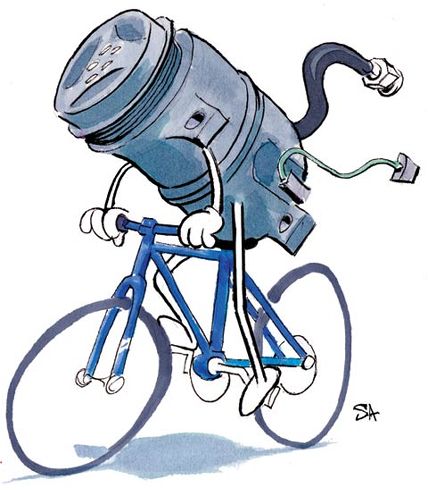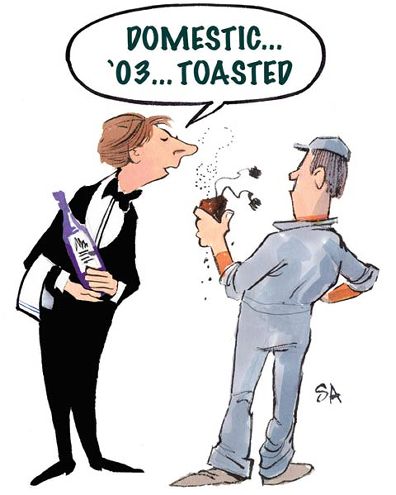Fighting Trouble CodesQ: I have a 2001 Rodeo with P0463 and P1860 codes. Where do I find these parts without paying markup through the dealers?

| 163 0602 02z Truck Trend Garage Fighting Trouble Codes
A: Those numbers are trouble codes stored in the PCM's memory and don't directly refer to parts. It's never a good idea to replace parts without first confirming the failure by means of the recommended diagnostic procedure. Code P0463 was set due to a high-voltage fault in the fuel-level sensor circuit. This may be caused by a bad sensor, the powertrain control module, or a short in the applicable circuit. Code P1860 shows up when there's a problem in the circuit driving the TCC (torque converter clutch) solenoid located in the automatic transmission. Again, it could be a defective TCC solenoid or the PCM, or an open or short to ground in the wiring between the two electronic components. Get it to a qualified shop to accurately diagnose the problems. After that, any parts store worth its salt should tell you if less-expensive aftermarket parts are available, or if you'd be better off with a dealer-only item.
Find the GM NoiseQ: I hope you can give me some peace and quiet. I purchased a 2002 GMC regular-cab Sierra with 30,000 miles on it, and purchased the extended warranty. The cab mounts/bushings/bolts make a clunking noise and scrunching sound when I stop or turn the vehicle into parking spots. I know the previous owner had the same problem. The dealer tried several times to repair the noise. It stays quiet for a couple weeks, but comes back. Can you suggest something for me to try or information I can give the dealer?
A: I haven't found any service information on body or cab-mount noises on 2002 Sierras. There have been clunk noises from the front coil springs corrected by a modified rubber insulator and also rear leaf-spring noises due to broken insulators at the end of the second-stage leaf. You may want to ask the technicians if they've conclusively narrowed down exactly which mount the noise is coming from. If not, they may want to use an electronic listening device to be sure they're focusing on the right area. Perhaps they only temporarily corrected the noise by lubricating the rubber mount as opposed to replacement. Or the noise could actually be emanating from a component near the mount, but not from the mount itself.
Making the GradeQ: My 2003 Toyota 4Runner has the 4.0-liter six-cylinder engine. The owner's manual shows regular unleaded fuel is required, but recommends premium for top performance and fuel economy. Specs for the same engine in the 2005 Tacoma show premium as the correct fuel. Should I be using premium in my 4Runner?
A: According to applicable Toyota service manuals, the 2003 4Runner and 2005 Tacoma, sharing the common 4.0-liter engine, should run on a minimum of 87 octane fuel, 91 octane or higher for added performance. If your primary goals are economic, use the minimum 87 octane. Any additional mpg from a higher-octane fuel isn't going to compensate for the difference in price. If you notice a spark knock under acceleration, change gas stations and/or up the octane until the potentially damaging noise is eliminated. If there's no change, take the 4Runner in for service. Drivers that focus on performance and utmost driveability should spend the extra cash and burn the 91 octane. If you can't make up your mind, split the difference with a midgrade gasoline. Consider it consumer conscientious of Toyota to stipulate choices in fuel.

| 163 0602 03z Truck Trend Garage Ac Compressor Cycling
A/C Compressor CyclingQ: Why does my 1995 GMC Sierra's A/C compressor switch on and off when I turn it off?
A: General Motors uses a wide variety of air-conditioning control assemblies that operate in slightly different ways. There are several circumstances that may affect your Sierra's air-conditioning compressor operation. One may be the system automatically energizing the compressor clutch when the controls are in Defrost, Defrost/Heater, or A/C Max mode, even with the A/C switch off. Some systems are designed this way because these particular functions are ineffective with the air-conditioning compressor off. The refrigerant needs to be flowing to draw moisture from the air or to provide maximum cooling capacity. The A/C compressor should normally cycle on and off when in use. This prevents a freezing condition at the system's evaporator core. Causes for an A/C clutch to engage when it's not supposed to include a defective A/C control assembly or PCM, a sticking A/C compressor clutch relay, or possible shorted wiring in a number of related circuits. There are also cases of defective compressor clutches not fully disengaging, a symptom of which is a scraping noise.
Smells Like a Bad SwitchQ: I have a 2003 Chevy Silverado. The air-conditioning had a burning smell, and, after I noticed it, I lost the high-speed mode. The smell disappeared after a week or so, but it came back and I lost the next-highest speed. I thought it was the switch, so I replaced the whole control face but it still only has the three speeds left. Is there a relay or something else that's failed? If so, how do I get to it?

| 163 0602 04z Truck Trend Garage Smells Like A Bad Switch
A: The 2003 Chevy truck may either have a manual or automatic HVAC (heating, ventilation and air-conditioning) system. The manual system operates blower operation through a control module (which you've already replaced) and a blower-motor resistor assembly. When the highest fan speed is selected, full voltage travels through the blower relay directly to the blower motor. When lower speeds are used, the voltage passes through select resistor coils, which lower the voltage and therefore reduce the speed of the blower motor. The automatic system does basically the same thing with the use of solid-state components. In this case, a blower-motor control processor replaces the blower-motor resistor assembly. Going by the burning odor, I'd guess you have the manual system, and the problem lies in the resistor assembly, which houses the resistor coils, and the blower-motor relay. Also, the blower motor itself may be drawing excessive current and burning these components up, one by one. Have the system diagnosed by a competent technician before replacing any additional parts.
Guarding Against GuardsQ: I am thinking of installing a brush guard or grilleguard on my 2001 Dodge Durango. I don't do any off-roading, but there are large numbers of deer in our area. Would the damage from hitting a deer at highway speed actually be increased by the presence of a brush guard? Also, could it make damage worse from typical auto-to-auto accidents? My concern is specifically with low speed fender-benders, since the front bumpers would no longer be the first point of contact.
A: I'm sure NHTSA or the Insurance Institute for Highway Safety would provide an accurate response if either performed crash testing before and after grilleguard installation. Unfortunately, that's not the case. And forget about the deer-impact analysis. An engineer from a well-known truck-accessory manufacturer confirms there's been no collision testing involved with the development of its various types of grilleguards--it would be hard, therefore, to say they provide added protection. For the most part, these products are cosmetic truck enhancements with limited shielding ability, unless they're mounted directly to the frame and reinforced. If you like the look, go for it; however, if you're looking for vehicle protection, you might have to keep looking.
GM Brake FixesQ: I have a 2004 Chevy Silverado 1500 4x4 with antilock brakes. The brake pedal is mushy and sometimes goes to the floor without any brake response at all. I've been to the Chevy dealer twice and, of course, the brakes didn't act up either time. I called Chevrolet customer service and had a three-way conversation with it and the Chevy dealer's service manager. They said I was paranoid and couldn't do anything about the brake problem. I read in Truck Trend that 2005 models went back to rear drum brakes and bigger discs in front. Was this change related to a brake problem? Have you heard of any fix for it, such as one for the master cylinder or antilock unit? My truck has 18,500 miles on it, and I'm willing to fix this problem myself to be on the safe side. I've been on the Internet and talked to others who have the same issue and have turned in a complaint to NHTSA, which has recorded accidents from this problem.
A: NHTSA has received similar complaints on Chevy trucks, but apparently not enough to warrant an investigation. There's currently a recall in effect for 2004 models involving the Hydro-Boost power-brake system on the 2500 and 3500 series trucks (1500 uses a vacuum booster) and also a Technical Service Bulletin dealing with unwanted low-speed antilock brake operation, but no documentation pertaining to an intermittent hydraulic failure. GM states that cost and material factors contributed to the brake changes to the 2005 Silverado--nothing about performance upgrading. Communication may be an issue. In the shop, "my brakes went to the floor" is a common phrase. Sometimes, it's an accurate description of a major hydraulic failure that caused a sudden drop at the brake pedal and a complete loss of front or rear brakes. Other times, it's incorrect terminology attempting to describe brake fade, a low or spongy pedal, normal ABS operation, etc. You may want to try another Chevrolet service department, and perhaps speak directly to the technician involved. They may be able to clarify your description and come up with a satisfactory answer or repair. The most common cause of a true intermittent drop at the pedal is a defective seal within the master-cylinder assembly.
Looking for Overdrive OptionsQ: Why don't ZF transmission builders add a double overdrive option to the ZF six-speed? This would help fuel economy and cruising and still have the super pulling power of the 4.10:1 gears. I have a 1996 4x4 Power Stroke F-250 with the ZF five-speed and a 4.10:1 rearend. My Power Stroke is fabulous at 141,000 miles, but at speeds of 65 mph, it turns over 2300 rpm.
A: The ZF Group, a worldwide leader in driveline and chassis technology, builds five- and six-speed manual transmissions for Ford light-duty trucks. Sounds like you've been considering buying a new Ford truck or perhaps swapping your five-speed for the six-speed, which came out with the 1999 Super Duty. But you then discovered that the five-speed's fifth-gear ratio is nearly identical to that of the six-speed's sixth, therefore defeating the purpose of considering the new transmission to lower rpm and increase fuel economy during unloaded highway driving. Gear Vendors, Inc. (800/999-9555; www.gearvendors.com) produces the Under/Overdrive auxiliary transmission, and U.S. Gear Corp. (800/874-3271; www.usgear.com) manufactures the Dual Range auxiliary trans. These units are commonly referred to as gear splitters and have two basic functions. One is to amplify towing power, the other to increase fuel economy. They actually supply shifts between shifts, with lower and higher ratios than the transmission was originally equipped with. This helps maintain rpm within the engine's peak torque and horsepower range while towing heavy loads. It delivers that extra gear you were looking for when the engine was either screaming in second or bogging in third. At the same time, you get that long-awaited double-overdrive shift (phase two of fifth gear), which may reduce highway engine speeds by as much as 22 percent. The 4x4 units bolt onto the transfer case with prices in the $3000-$4000 range (including installation). Speak with both manufacturers' technical representatives about pros, cons, and the details of each product's operation. You may never cover the cost with the extra fuel economy. You have to enjoy the driving upgrade to make it worth the money.
How To Reach AlexIf you have a technical question regarding your pickup, SUV, or van, feel free to contact Alex, a master technician with the National Institute for Automotive Service Excellence. Send a letter to him in care of Truck Trend Garage, 831 S. Douglas Street, El Segundo, CA 90245, or e-mail us at
[email protected]. Please include the VIN with your question. Due to the volume of questions received every month, we cannot guarantee that everyone's question will be personally answered or will appear in the magazine.
Can't wait for help with a problem you're having with your Truck or SUV? Ask the expert we trust here at Truck Trend Garage--visit Alex Steele at www.RealWorldAutomotive.com.
 | 163 0602 02z Truck Trend Garage Fighting Trouble Codes
A: Those numbers are trouble codes stored in the PCM's memory and don't directly refer to parts. It's never a good idea to replace parts without first confirming the failure by means of the recommended diagnostic procedure. Code P0463 was set due to a high-voltage fault in the fuel-level sensor circuit. This may be caused by a bad sensor, the powertrain control module, or a short in the applicable circuit. Code P1860 shows up when there's a problem in the circuit driving the TCC (torque converter clutch) solenoid located in the automatic transmission. Again, it could be a defective TCC solenoid or the PCM, or an open or short to ground in the wiring between the two electronic components. Get it to a qualified shop to accurately diagnose the problems. After that, any parts store worth its salt should tell you if less-expensive aftermarket parts are available, or if you'd be better off with a dealer-only item.
Find the GM Noise
| 163 0602 02z Truck Trend Garage Fighting Trouble Codes
A: Those numbers are trouble codes stored in the PCM's memory and don't directly refer to parts. It's never a good idea to replace parts without first confirming the failure by means of the recommended diagnostic procedure. Code P0463 was set due to a high-voltage fault in the fuel-level sensor circuit. This may be caused by a bad sensor, the powertrain control module, or a short in the applicable circuit. Code P1860 shows up when there's a problem in the circuit driving the TCC (torque converter clutch) solenoid located in the automatic transmission. Again, it could be a defective TCC solenoid or the PCM, or an open or short to ground in the wiring between the two electronic components. Get it to a qualified shop to accurately diagnose the problems. After that, any parts store worth its salt should tell you if less-expensive aftermarket parts are available, or if you'd be better off with a dealer-only item.
Find the GM Noise | 163 0602 03z Truck Trend Garage Ac Compressor Cycling
A/C Compressor Cycling
| 163 0602 03z Truck Trend Garage Ac Compressor Cycling
A/C Compressor Cycling | 163 0602 04z Truck Trend Garage Smells Like A Bad Switch
A: The 2003 Chevy truck may either have a manual or automatic HVAC (heating, ventilation and air-conditioning) system. The manual system operates blower operation through a control module (which you've already replaced) and a blower-motor resistor assembly. When the highest fan speed is selected, full voltage travels through the blower relay directly to the blower motor. When lower speeds are used, the voltage passes through select resistor coils, which lower the voltage and therefore reduce the speed of the blower motor. The automatic system does basically the same thing with the use of solid-state components. In this case, a blower-motor control processor replaces the blower-motor resistor assembly. Going by the burning odor, I'd guess you have the manual system, and the problem lies in the resistor assembly, which houses the resistor coils, and the blower-motor relay. Also, the blower motor itself may be drawing excessive current and burning these components up, one by one. Have the system diagnosed by a competent technician before replacing any additional parts.
Guarding Against Guards
| 163 0602 04z Truck Trend Garage Smells Like A Bad Switch
A: The 2003 Chevy truck may either have a manual or automatic HVAC (heating, ventilation and air-conditioning) system. The manual system operates blower operation through a control module (which you've already replaced) and a blower-motor resistor assembly. When the highest fan speed is selected, full voltage travels through the blower relay directly to the blower motor. When lower speeds are used, the voltage passes through select resistor coils, which lower the voltage and therefore reduce the speed of the blower motor. The automatic system does basically the same thing with the use of solid-state components. In this case, a blower-motor control processor replaces the blower-motor resistor assembly. Going by the burning odor, I'd guess you have the manual system, and the problem lies in the resistor assembly, which houses the resistor coils, and the blower-motor relay. Also, the blower motor itself may be drawing excessive current and burning these components up, one by one. Have the system diagnosed by a competent technician before replacing any additional parts.
Guarding Against Guards